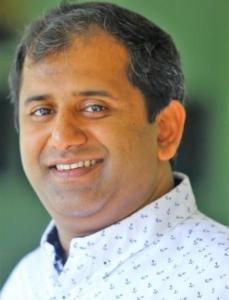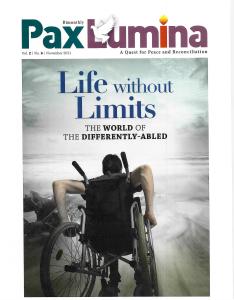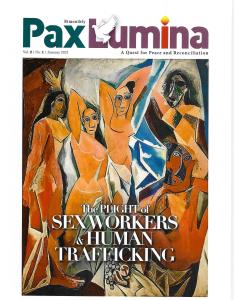 The Public Theology of Binoy Jacob
The Public Theology of Binoy Jacob
Patheos PT 5004
What is public theology? Let me answer by introducing you to Pax Lumina. More importantly, let me introduce you to Binoy Jacob, S.J., its managing editor.
In Luke 4, Jesus quotes Isaiah.
“The Spirit of the Lord is upon me,
because he has anointed me
to bring good news to the poor.
He has sent me to proclaim release to the captives
and recovery of sight to the blind,
to let the oppressed go free,
to proclaim the year of the Lord’s favor.”
To bring good news to the poor is the task of Isaiah, Jesus, and now Binoy Jacob.
What is public theology? I’ve been trying to answer that question in this Patheos series called, Public Theology. I’ve introduced you to Americans Robert Benne and Katie Day, South Korean Paul Chung, Kenyan Mwaambi Gideon Mbûûi, Chinese Kang Phee Seng, and others laboring in Christ’s vineyard. The worldwide Society of Jesus engages in public theology on an admirable scale, publishing America in America. Now it’s time to visit India and meet Binoy Jacob in his own words.
If you want more resources on Public Theology, click here.
Meet Binoy Jacob
Binoy Jacob is a Jesuit of Kerala Province, India. Currently he is the Director of Loyola Institute of Peace and International Relations (LIPI), Kochi, and the Managing Editor of Pax Lumina (bi-monthly in English: www.paxlumina.com) and EZHUTHU Magazine (monthly in vernacular: www.ezhuthu.org), published by LIPI. He is the Coordinator of Higher Education Commission of Kerala Jesuits and also the Coordinator of the Peace and Reconciliation Network of the Jesuit Conference of South Asia.
Dr. Jacob holds doctorates in Mathematical Sciences (India) and in Systematic Theology (USA). He is a member of Clavius group for Mathematicians, U.S.A. He has published books and articles both in national and international journals, and presented papers on topics related to science, philosophy and religion. He may be contacted ([email protected])
Defining Public Theology
What is the definition of Public Theology with which you work? How do you think of the Pax Lumina mission in India?
 Christian theology seen as a process of reflection-action confined to the Christian community makes little sense in the Indian context where it is a negligible minority. I find most of the Christian publications catering to its own faithful adherents, neglecting the world beyond. To have an impact on the wider society, theology has to engage in conversation with the multi-religious and secular fabric of society. Pax Lumina with its multi-pronged approach tries to fill that gap. To me that defines public theology.
Christian theology seen as a process of reflection-action confined to the Christian community makes little sense in the Indian context where it is a negligible minority. I find most of the Christian publications catering to its own faithful adherents, neglecting the world beyond. To have an impact on the wider society, theology has to engage in conversation with the multi-religious and secular fabric of society. Pax Lumina with its multi-pronged approach tries to fill that gap. To me that defines public theology.
Pax Lumina is an e-magazine. It is published by Loyola Institute of Peace and International Relations (LIPI), Kochi, India. The mandate given to LIPI by the Jesuit Conference of South Asia is to promote peace and reconciliation. This is a core aspect of the preaching of the Gospel in a wounded world.
As part of its peace-building activities LIPI has been conducting academic programmes and workshops for people from all walks of life. Pax Lumina is an attempt at broadening the scope of these activities beyond geographical limits.
The Three Publics: Church, Academy, and Wider Culture
Do you have a preferred way to promote the perichoresis between the church, the academy, and the wider culture?
We find the Indian church very reluctant to engage in adult-level conversation on issues of public importance. Unfortunately, this is the case even when the church is committed to serving the nation through its educational institutions, hospitals and charitable organizations. Pax Lumina draws its inspiration from the four apostolic preferences as defined by the Jesuits. They are spiritual enhancement, walking with the marginalized, accompanying the youth and caring for the common home. Pax Lumina is an Indian response to these preferences and keeps the wider culture as its universe of discourse. It brings together the academy, the activists and the cultural leaders on a common platform of conversation for mutual challenge as well as nourishment. The articles we publish are mostly experience based and action oriented.
Spell out the PaxLumina editorial vision
 Our editorial vision has a two-fold focus. First, it addresses primarily the educated sector of the wider public. Second, its overarching concern is for people on the periphery, an area mostly ignored by the mainline media. We aim at bringing this concern to the centre of public discourse. The topics we choose for issues of Pax Lumina are indicative of this option. Justice for Migrants (July 2020), Covid 19, Women and Peace (September 2020), The Plight of the Manual Scavengers (November 2020), Plight of Sex Workers (January 2021), Children without Childhood (March 2021), Excluded Youth (May 2021), Pandemic and Peace (July 2021), Religion and Peace (September 2021), Life without Limits (November 2021), reflect this option. These are also concerns of the contemporary world.
Our editorial vision has a two-fold focus. First, it addresses primarily the educated sector of the wider public. Second, its overarching concern is for people on the periphery, an area mostly ignored by the mainline media. We aim at bringing this concern to the centre of public discourse. The topics we choose for issues of Pax Lumina are indicative of this option. Justice for Migrants (July 2020), Covid 19, Women and Peace (September 2020), The Plight of the Manual Scavengers (November 2020), Plight of Sex Workers (January 2021), Children without Childhood (March 2021), Excluded Youth (May 2021), Pandemic and Peace (July 2021), Religion and Peace (September 2021), Life without Limits (November 2021), reflect this option. These are also concerns of the contemporary world.
The maiden issue (May 2020) focused on Covid 19 and its impact on various segments of people. Stressing the significance of hope amidst melancholy, we presented some classical narratives of hope. An article by Harsh Mander (July 2021) titled “Circles of Kindness” highlighted the relentless fight of Fr Stan Swamy SJ for the rights of the tribals in Northern India. Other articles that dealt with crucial issues of everyday life were “Giving Visibility to Migrants” by Denzil Fernandes, “Women are the Worst Sufferers” by Syeda Hameed (Sept. 2021), and “How to End Manual Scavenging” by Beswada Wilson (Nov. 2020). The insights from these discussions have significance far beyond the national borders, and may help in evolving models of feasible solutions to many plaguing problems. This liberating mission, in our understanding, is inspired by a Christian vision and so is an integral part of public theology.
What about Science in Public Theology?
Do you believe the public theologian should be concerned about the intersection of science with society? Why? Or why not?
Science and religion are the two major pillars that mould the culture of global humanity today. Both of them are engaged in the pursuit of truth, But their approaches are different. I look at science and theology not as contradictory but as complementary disciplines. A public theologian must engage in dialogue with science in view of providing a rational basis to faith. The rational basis makes faith more intelligible in contemporary culture. Possibilities of interpreting theological mysteries from scientific perspectives can be further explored.
Science can also act as a corrective force in theological thinking. It becomes all the more important in the Indian context where superstitions and pseudo sciences continue to be widespread.
Yet science has its limitations too. Science raises certain questions which science itself cannot answer. Science is able to talk about the ‘how’ of the material reality, not about the ‘why’ of it? Science needs to draw meaning and insights from other branches of knowledge including theology for a better understanding of reality. Science and theology should acknowledge each other’s strengths and limitations. And both should be humble enough to dialogue with each other in the creation of a better world.
Engaging Confusion and Mayhem
Social media has put our world on overload with a cacophony of trivia, twaddle, disinformation, fake news, conspiracy theories, hostility, and even terrorist recruitment. What opportunities or responsibilities does this present to the conscientious public theologian?
 Theologians must be vigilant about the confusing condition created by the social media. It is a post-truth world, no doubt. But as one always standing for truth and acting out of convictions, the theologian has responsibility to provide ethical orientation and value clarification. Social media itself can become an effective tool for us in this task. Best models and practices of communal harmony and peace building can be shared through the social media.
Theologians must be vigilant about the confusing condition created by the social media. It is a post-truth world, no doubt. But as one always standing for truth and acting out of convictions, the theologian has responsibility to provide ethical orientation and value clarification. Social media itself can become an effective tool for us in this task. Best models and practices of communal harmony and peace building can be shared through the social media.
A Public theologian need not feel intimidated by the mayhem created by an irresponsible social media. What is called for is a proactive engagement with it. Not withdrawal, but engagement. The proactive steps in peace education and peace building by LIPI is one illustration. While I pen it, mission stations and educational institutions in some parts of of India are threatened or ransacked under the false charge of Christian proselytisation. Large scale disinformation campaign though the social media often acts as the villain behind communal riots, lynching of religious minorities and Dalits, and discrediting of human rights activists. Public theology has a responsibility to bring in a contrary narrative into the public discourse.
Conclusion
Public Christian theology is alive and well in India.
What is public theology? I have been proffering the notion that we should think of public theology as conceived in the church, critically refined in the academy, and offered to the wider culture for the sake of the global common good. Tacitly, this is the model of public theology with which Binoy Jacob and Pax Lumina work.
Thank you, Binoy, for exercising your mission.
▓
 Ted Peters is a Lutheran pastor and emeritus seminary professor. His one volume systematic theology is now in its 3rd edition, God—The World’s Future (Fortress 2015). He has undertaken a thorough examination of the sin-and-grace dialectic in two works, Sin: Radical Evil in Soul and Society (Eerdmans 1994) and Sin Boldly! (Fortress 2015). Watch for his forthcoming, The Voice of Public Christian Theology (ATF 2022). See his website: TedsTimelyTake.com.
Ted Peters is a Lutheran pastor and emeritus seminary professor. His one volume systematic theology is now in its 3rd edition, God—The World’s Future (Fortress 2015). He has undertaken a thorough examination of the sin-and-grace dialectic in two works, Sin: Radical Evil in Soul and Society (Eerdmans 1994) and Sin Boldly! (Fortress 2015). Watch for his forthcoming, The Voice of Public Christian Theology (ATF 2022). See his website: TedsTimelyTake.com.
▓













